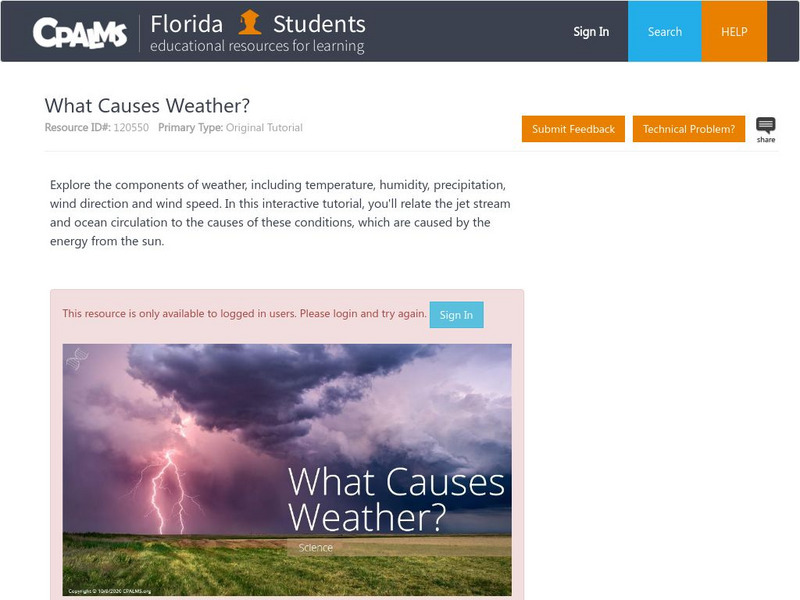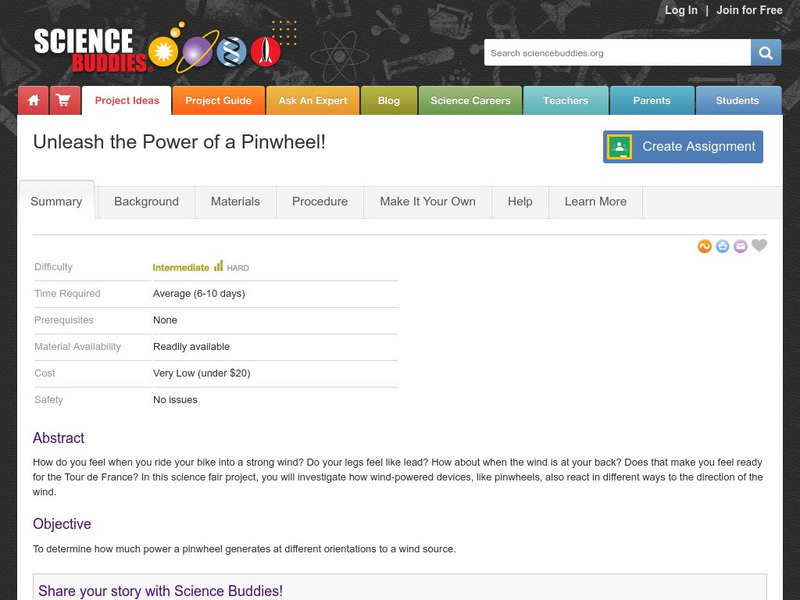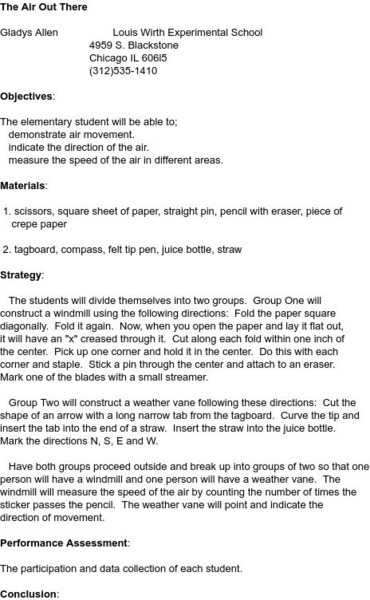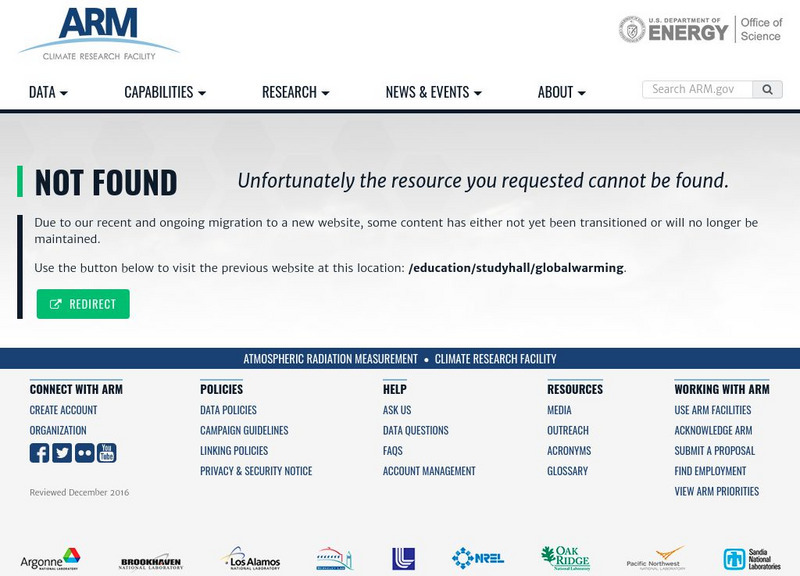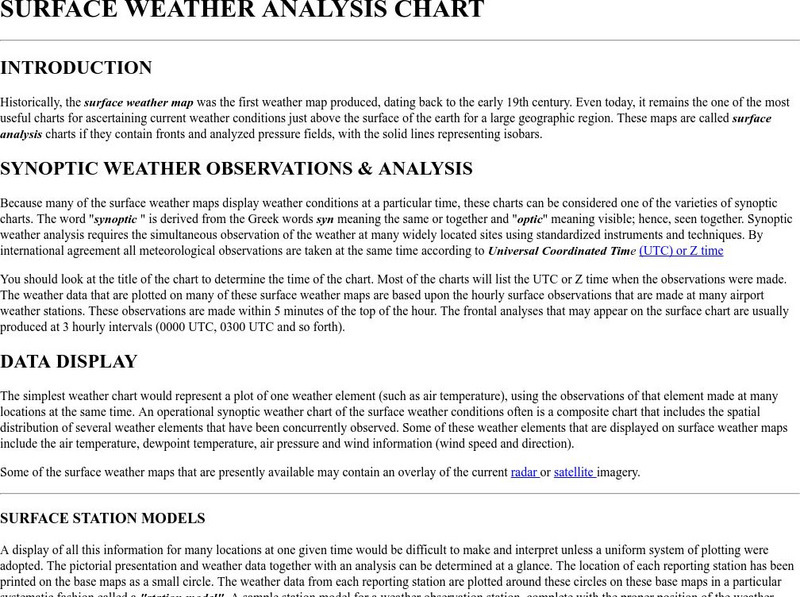Other
Lee Trampleasure: Science Education: Coriolis Effect
Examine three examples of the Coriolis Effect with reference to wind. The effect is that when an object is moving perpendicular to the rotation of a sphere the object will appear to travel in a curved line. Prevailing winds will look as...
Curated OER
Etc: Maps Etc: Rainfall and Winds in South America, 1916
A 1916 map of South America, showing annual rainfall and prevailing winds. This map shows the wind direction of the Northeast Trades, the Atlantic and Pacific Southeast Trades, and the Westerlies, and shows their effect on rainfall...
CPALMS
Florida State University Cpalms: Florida Students: What Causes Weather?
Determine parameters of weather; including specifically temperature, humidity, precipitation, wind direction and wind speed in this tutorial. During this tutorial, you will relate the jet stream and ocean circulation to the causes of...
PBS
Nova: A Five Day View of the Jet Stream
This animated 5 day forecast for the jet stream shows wind direction and wind speed. The forecast was generated on January 1, 2001 by the Fleet Numerical Meteorology and Oceanography Center.
Science Buddies
Science Buddies: Unleash the Power of a Pinwheel!
In this science fair project, you will learn more about wind-powered devices, like pinwheels. Much like pinwheels, we react in different ways to the direction of the wind when we ride bikes, or even try to walk.
Other
California Energy Commission: Science Projects: Make an Anemometer
Nice brief description of this wind speed device and the directions to make your own.
Curated OER
University of Texas: India: Major Crop Areas
From a 1973 map showing the major crops grown in India. This map from the Perry Castaneda Collection also shows the direction of the wind in the monsoon season and the winter flow.
Other
Ithaca Hs Ny/electrical Generator Ac or Dc/applet
What a lovely little applet! You can speed/slow it, change it from AC to DC, plot the voltage as it rotates, change direction, control other information. Real neat.
NOAA
Noaa: Photo Library: Solar Powered Surface Automated Measurement (Sam) Site
The National Oceanic and Atmospheric Administration provides a photo library of severe weather formations and the instruments that measure them. Here you can find a photograph of a solar-powered Surface Automated Measurement (SAM) site....
Countries and Their Cultures
Countries and Their Cultures: Jews of Iran
Until mass emigration began in 1948, Jews constituted one of the largest and longest-settled non-Muslim populations in Iran. Dispersed in every city and town in the country, Iranian Jews were almost always a minority except in a few...
Science and Mathematics Initiative for Learning Enhancement (SMILE)
Smile: The Air Out There
Cooperative learning activity in which students will create a windmill and a weather vane. Students will find the direction of wind and the speed relative to the spinning windmill. Great for K-2.
American Museum of Natural History
American Museum of Natural History: O Logy: Stuff to Do: Make a Weather Station
Make a wind vane, rain gauge, and barometer and learn how to measure wind direction, rainfall, and air pressure.
The Franklin Institute
Franklin Institute: Make Your Own Weather Station
This page, provided by the Franklin Institute, shows you how to become an amateur meteorologist. Directions on how to construct a weather station include the barometer, hygrometer, rain gauge, weather vane, and compass.
Math Graphs
Houghton Mifflin: Math Graphs: Direction and Vectors 3 [Pdf]
Students use a weather map to determine the points where the wind speed is the greatest. The resource consists of an enlarged printable version of a weather map available in PDF format.
National Weather Service
National Weather Service: Jet Stream: The Jet Stream
The concept of jet streams is explained on this site. Read about why jet stream winds blow from west to east, what the polar jet and subtropical jet are, the role that the rotation of the Earth plays, etc.
Khan Academy
Khan Academy: Particle Systems With Forces
Applying the forces of wind and/or gravity to a particle system so that the system can apply force to all individual particles. In addition, adding a repeller where all the force vectors have a different direction is illustrated.
PBS
Pbs: American Experience: The Hurricane of '38
Experience the devastating Hurricane of 1938 that roared up the east coast with survivor interviews, photos, and video clips. Includes an explanation of hurricane formation.
PBS
Pbs Learning Media: A Five Day View of the Jet Stream
This animation from NOVA Online lets you examine a five-day view of the jet stream.
Other
Boston Children's Museum: Beyong the Chalkboard: Nephoscopes
In this activity, children will create a tool called a nephoscope that helps scientists determine the direction that clouds are moving, which also tells them the direction that the wind is blowing above them.
Other
Arm Program's Education Center: Global Warming
An all purpose site with something for everyone. Learn about global warming and climate change, ask a scientist, take a quiz, or get a lesson plan!
Science Education Resource Center at Carleton College
Serc: Tracking and Predicting the Weather
Learners track barometric pressure, wind direction, temperature, and clouds. The class records daily readings in these for areas and attempt to formulate patterns to use in forecasting the weather based on these elements.
US Navy
Office of Naval Research: Oceans in Motion Currents
Use this site to learn what the Navy has to say about ocean currents and then test your knowledge with their quiz.
University of Wisconsin
Atmospheric and Oceanic Sciences: Surface Weather Analysis
Explains the use of synoptic weather analysis in preparing weather maps and forecasting. Discusses the use of symbols as well.
Other popular searches
- Measuring Wind Direction
- Wind Direction Recorder
- Wind Direction and Speed
- Wind Direction With Compass
- Wind Direction Lessons
- Finding Wind Direction



